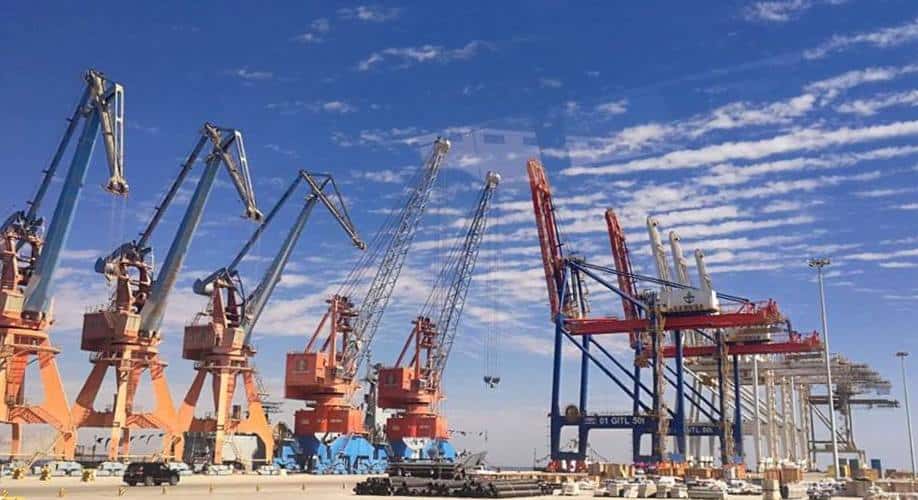Pakistan’s restive Balochistan province is experiencing a new wave of sit-in protest this week as locals claim that Islamabad has failed to address their concerns regarding China’s Belt and Road infrastructure endeavours in the country.
The development in Gwadar district, which is the backbone of China-Pakistan Economic Corridor (CPEC), had decelerated during the leadership of former Prime Minister Imran Khan due to friction between the two countries, the Nikkei Asia news agency reported.
The leaders have voiced that their concerns over thousands of illegal fishing trawlers from abroad and other parts of Pakistan depleting marine resources, insufficient water and power supplies and a clampdown on informal trade across the border with Iran have not been addressed by the government.
Gwadar Ko Haq Do Tehreek (the Gwadar Rights Movement) leader Molana Hidayat ur Rehman announced a major sit-in starting on Thursday that would last for an indefinite period accusing the government of not fulfilling the promises about the illegal fishing trawlers along with other issues.
Rehman led a month-long sit-in against the unnecessary checkposts and fishing trawlers in Gwadar district last year. Thousands of people joined the protest.
The protesters want the government to completely stop deep-sea trawling off Gwadar, ease up on the informal border trade that had supported livelihoods, reduce the number of checkpoints and allow fishermen to operate near the strategic port, among others, the publication said.
“I have public support, and if I am arrested then there will be strong reaction across the province,” the Gwadar Rights Movement leader said.
Rehman has threatened that if his demands are not met then the Gwadar port would be shut down. According to experts, the protest could affect the activities at the port.
The government of Pakistan has been dealing with animosity among the tribes of Balochistan since the time the country came into existence in 1947.
The causes of the conflict with Balochistan include a ripe ethnic nationalism along with feelings of economic and political exclusion.
Balochistan is located in the south west of Pakistan and constitutes half of the country’s territory. Demographically though it constitutes a mere 3.6 per cent of the total population of Pakistan. The province is home to over 13 million people, mostly Baloch.
Balochistan is Pakistan’s largest, but least developed province. It is one of the most important provinces of Pakistan because of the high concentration of natural resources including gas, oil, copper and gold.
However, despite the richness in natural resources, Balochistan continues to remain the poorest province of Pakistan.
In 2015, China announced the China-Pakistan Economic Corridor (CPEC) project in Pakistan worth USD 46 billion, of which Balochistan is an integral part.
It would link Pakistan’s southern Gwadar port in Balochistan on the Arabian Sea to China’s western Xinjiang region. It also includes plans to create road, rail and oil pipeline links to improve connectivity between China and the Middle East. The Baloch have opposed China’s increasing involvement in the province.
The CPEC has not benefited the people of Balochistan while people of other provinces enjoy the fruits of the mega project. This has led to widespread protests as the Chinese are viewed as encroachers who are squeezing out all the wealth from the region.
Rasheed Baloch, a political analyst based in Quetta, told Nikkei Asia that Rehman's sit-in would hinder movement in and out of the port. This would include "VIP movements in Gwadar, which are frequent," he added, referring to visits like Sharif's or those by Chinese dignitaries.
Baloch said that Rehman knows the "threat of closing down Gwadar Port" is a card he can play to extract "concessions for his Gwadar-focused demands."
Many see the possible protest as an attempt by Rehman, whom locals affectionately call simply Molana, to cement himself as the town's most popular leader -- smoothing the path to larger political goals.
Nasir Rahim Sohrabi, president of the Rural Community Development Council, told Nikkei that Rehman would use the upcoming protest to strengthen the position of his political group. Already, candidates backed by Rehman won a significant portion of seats in local government polls in May.
"Rehman will use the protest to put pressure on the government so that his candidates are not manipulated out of the mayoral race of Gwadar next month," Sohrabi said.
Baloch made a similar point. "Last year, the protest of Rehman provided relief to the people of Gwadar, and now he wants to carry out another protest to further gain public sympathy, which can then be translated into electoral success," he said.
Baloch suggested that Rehman aims to solidify the Gwadar Rights Movement as the most powerful political force in Balochistan's Makran division, the coastal area that hosts Chinese interests in southwestern Pakistan.
Background interviews with multiple people in Gwadar suggested that Rehman is likely to continue the protest as long as the government does not give him what he wants.
People close to the government dismiss Rehman's claim that the protest would be for the public's benefit.
"Since I assumed office in 2018, I have ensured that all major problems of Gwadar get resolved, and most of them have been resolved," argued Aslam Bhootani, a member of Pakistan's National Assembly representing Gwadar, told Nikkei. He claimed Rehman is staging this fight for political gain.
With just days to go before the protest, Hanif Kiazai, a spokesman for Rehman's group, said "a meeting of the advisory council of [the Gwadar Rights Movement] will be held soon to decide the exact course of action about the sit-in protest."


